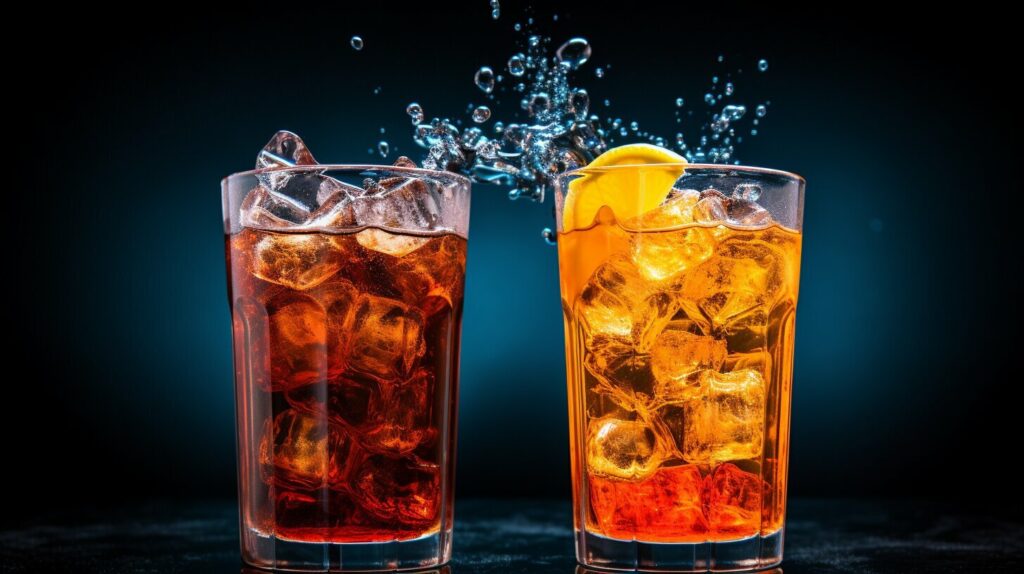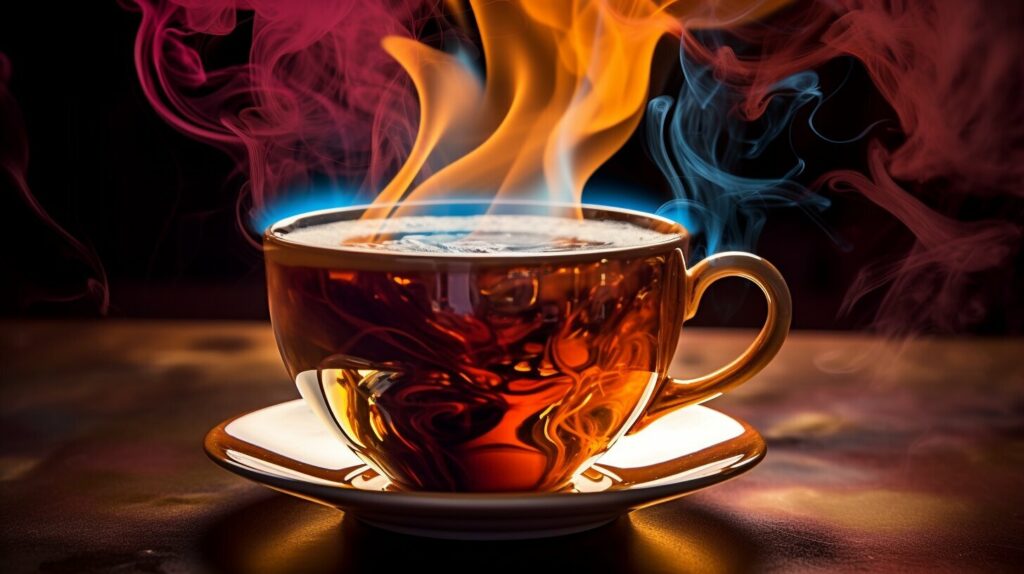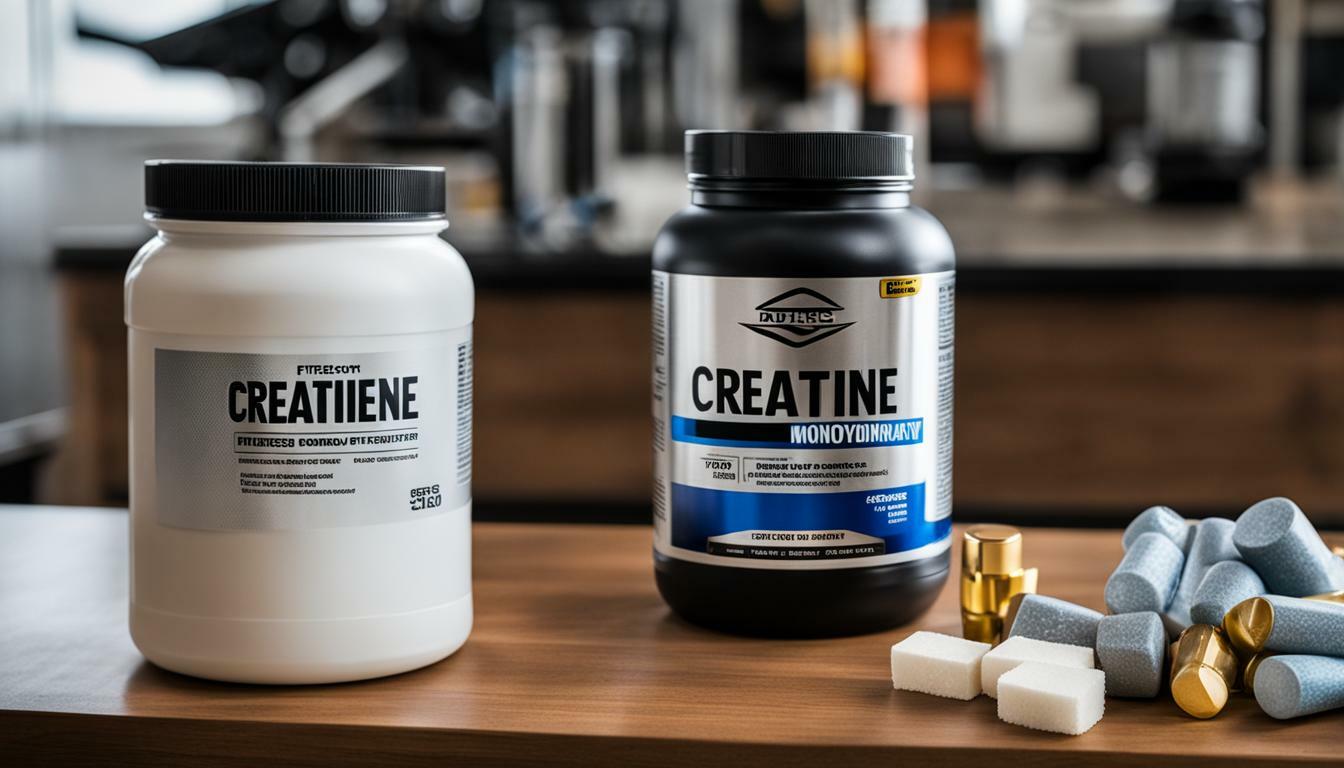Welcome to our article on the difference between taurine and caffeine in energy drinks. When it comes to these popular beverages, understanding their ingredients and how they affect our bodies is crucial. In this section, we will explore the unique properties of taurine and caffeine, shedding light on their distinct roles in providing an energy boost.
Taurine, an amino acid naturally found in the body, plays a significant role in hydration, mineral balance, and brain function. Unlike other amino acids, it does not contribute to protein building but instead supports processes such as regulating the immune system and maintaining central nervous system function. While taurine is a common ingredient in energy drinks, it does not directly provide an energizing effect and may even contribute to the crash experienced after consumption.
On the other hand, caffeine, a stimulant, blocks the effects of adenosine, a neurotransmitter responsible for tiredness. By increasing adrenaline levels and promoting alertness, caffeine provides the desired boost of energy, making you feel more awake and focused.
Key Takeaways:
- Taurine is an amino acid that supports hydration, mineral balance, and various bodily functions.
- Caffeine, a stimulant, blocks the effects of adenosine and increases adrenaline levels.
- Taurine does not directly provide an energizing effect in energy drinks.
- Caffeine provides the desired boost of energy and promotes alertness.
- Understanding the differences between taurine and caffeine is essential when evaluating the effects of energy drinks.
Pros and Cons of Taurine
Taurine, a common ingredient in energy drinks, has both benefits and potential side effects. Understanding its pros and cons can help individuals make informed decisions about its consumption. Here are some key points to consider:
The Benefits of Taurine
- Taurine may help improve blood sugar balance, making it potentially beneficial for individuals with diabetes or insulin resistance.
- It has been suggested that taurine could support heart health by reducing blood pressure and improving cholesterol levels.
- Some studies have shown that taurine can aid exercise performance by reducing muscle damage and soreness.
The Side Effects of Taurine
“While taurine can have positive effects, it’s important to be aware of potential side effects when combined with large doses of caffeine. Some individuals may experience increased heart rate, anxiety, or difficulty sleeping.”
Moreover, it is worth noting that taurine may be more suitable as a nootropic for cognitive function and brain health rather than as an energy enhancer for athletes. Further research is needed to fully understand the effects and potential risks associated with taurine in energy drinks.
| Pros of Taurine | Cons of Taurine |
|---|---|
| May improve blood sugar balance | May cause side effects when combined with large doses of caffeine |
| Could support heart health | May not directly provide energizing effects |
| May aid exercise performance | Potentially more suitable as a nootropic for brain health |
Considering individual needs and consulting a healthcare professional is advised before incorporating energy drinks or supplements containing taurine into one’s routine.

Conclusion
Taurine is a common ingredient in energy drinks that offers potential benefits such as improved blood sugar balance, heart health support, and exercise performance. However, it is crucial to be aware of its potential side effects, especially when combined with high doses of caffeine. Taurine may be more appropriate as a nootropic for brain health rather than an energy enhancer for athletes. Considering individual needs and consulting a healthcare professional is essential before consuming energy drinks or supplements containing taurine.
Pros and Cons of Caffeine
Caffeine is a popular ingredient in energy drinks due to its ability to increase energy levels and improve focus and alertness. It is a stimulant that works by blocking the effects of adenosine, a neurotransmitter that causes tiredness. However, like any substance, caffeine has both benefits and potential drawbacks.
The Pros of Caffeine
- Increased Energy: Caffeine acts on the central nervous system, reducing fatigue and increasing energy levels. It can help combat feelings of drowsiness and keep you alert and focused throughout the day.
- Improved Exercise Performance: Caffeine has been shown to enhance athletic performance by improving endurance, increasing power output, and reducing perceived exertion. It can also enhance fat metabolism, allowing the body to use fat as a fuel source during workouts.
- Enhanced Mood: Caffeine can boost mood and feelings of well-being by increasing dopamine production in the brain. It can provide a temporary sense of euphoria and improve motivation and productivity.
The Cons of Caffeine
- Potential Side Effects: Excessive caffeine consumption can lead to side effects such as jitters, anxiety, increased heart rate, and difficulty sleeping. It is important to consume caffeine in moderation and be mindful of individual tolerance levels.
- Dependency and Withdrawal: Regular caffeine consumption can lead to dependency, resulting in withdrawal symptoms when caffeine intake is reduced or stopped. These symptoms may include headaches, fatigue, and irritability.
- Disrupted Sleep: Caffeine can interfere with sleep quality and quantity, especially when consumed close to bedtime. It is advisable to limit caffeine intake in the afternoon and evening to help maintain a healthy sleep schedule.
While caffeine can offer numerous benefits, it is important to be aware of its potential side effects and to consume it in moderation. It is always a good idea to consult with a healthcare professional before making any significant changes to your caffeine intake or incorporating energy drinks into your routine.

Comparison Between Taurine and Caffeine
When comparing taurine and caffeine in energy drinks, it is important to understand their unique characteristics and effects. Taurine, as an amino acid, does not directly provide energizing effects but rather plays a role in supporting various bodily functions. On the other hand, caffeine is a stimulant that boosts energy levels and enhances focus.
While taurine may contribute to reducing muscle damage and fatigue, caffeine is primarily responsible for the immediate energizing effects of energy drinks. Taurine is often described as a relaxing amino acid and may have potential benefits for blood sugar balance and heart health. In contrast, caffeine stimulates the nervous system, reducing tiredness and increasing alertness.
To further illustrate the differences between taurine and caffeine, let’s take a closer look at each ingredient:
| Taurine | Caffeine |
|---|---|
| Does not directly provide energizing effects | Immediate energizing effects |
| Potential benefits for blood sugar balance and heart health | Enhances focus and exercise performance |
| More suitable as a nootropic for focus and brain health | Stimulates the nervous system to reduce fatigue |
As seen in the table, both taurine and caffeine have their own set of pros and cons. It is essential to consider individual needs and consult a healthcare professional before incorporating any supplement or energy drink into a routine. Understanding the specific effects of taurine and caffeine can help individuals make informed choices based on their desired outcomes and overall health goals.

Maximizing Caffeine’s Effects with L-theanine
To enhance the effects of caffeine and minimize potential side effects, combining it with L-theanine can be advantageous. L-theanine is an amino acid known for promoting relaxation without causing drowsiness. When caffeine and L-theanine are combined, they work synergistically to improve focus, alertness, and cognitive performance.
Research has shown that the combination of caffeine and L-theanine provides sustained energy without the crash often associated with consuming caffeine alone. This is because L-theanine helps balance out the stimulating effects of caffeine, reducing jitters and anxiety while maintaining mental clarity. The calming properties of L-theanine also help to counteract the negative aspects of caffeine, providing a smoother and more enjoyable energy boost.
Proper Wild energy shots, for example, offer a clean and effective energy alternative that harnesses the power of both caffeine and L-theanine, without the need for taurine. By including L-theanine alongside caffeine, they provide a balanced and sustainable source of energy, perfect for those who want to maximize their focus and productivity without experiencing the crash commonly associated with energy drinks.

When it comes to energy drinks, it is important to consider the individual’s needs and consult a healthcare professional before incorporating them into a routine. Maximizing the effects of caffeine with L-theanine can provide a more focused and sustainable energy boost, without the potential negative effects of excessive caffeine consumption.
The Downside of Taurine in Energy Drinks
Taurine is a common ingredient found in many energy drinks. While it has some potential benefits, it also has its downsides. One of the main downsides of taurine in energy drinks is that it does not have direct energizing effects. Unlike caffeine, taurine does not stimulate the nervous system or increase alertness. This means that consuming taurine alone may not provide the same boost of energy that people expect from energy drinks.
Furthermore, some studies have suggested that high doses of taurine combined with caffeine can have potential side effects. These side effects can include increased heart rate, elevated blood pressure, and even adverse effects on the liver. It is important to note that more research is needed to fully understand the long-term effects of taurine and caffeine in energy drinks.
It is also worth mentioning that taurine may be more beneficial as a nootropic for brain health rather than an energy enhancer for athletes. Some research suggests that taurine may improve cognitive function and support brain health, but its effects on physical performance are limited. Therefore, individuals who are looking for a boost in physical energy may be better off focusing on other ingredients, such as caffeine.

Table: Side Effects of Taurine in Energy Drinks
| Side Effects | Description |
|---|---|
| Increased heart rate | Taurine combined with caffeine can cause an increase in heart rate, which may be concerning for individuals with underlying heart conditions. |
| Elevated blood pressure | High doses of taurine and caffeine can lead to a temporary increase in blood pressure, which may be problematic for individuals with hypertension or other cardiovascular issues. |
| Liver issues | Some studies have suggested that excessive taurine consumption, particularly when combined with caffeine, may have adverse effects on the liver. |
In conclusion, while taurine may have some potential benefits, such as supporting brain health, it also comes with its downsides when used in energy drinks. Its lack of direct energizing effects and potential side effects when combined with caffeine make it important for individuals to be aware of the risks and consult a healthcare professional before consuming energy drinks or supplements containing taurine.
Conclusion
In conclusion, the difference between taurine and caffeine in energy drinks is significant. Taurine, an amino acid found naturally in the body, plays a role in various bodily processes but does not directly contribute to energizing effects. On the other hand, caffeine, a stimulant, increases energy levels and enhances focus and exercise performance.
While taurine may have potential benefits for blood sugar balance and heart health, it is important to note that it does not provide the immediate energy boost that caffeine does. Combining caffeine with L-theanine can maximize the benefits of caffeine while reducing potential side effects like jitters and anxiety.
When choosing energy drinks or supplements, it is crucial to consider individual needs and consult a healthcare professional. Understanding the differences between taurine and caffeine and their specific effects can help make informed decisions about energy drink consumption.
FAQ
What is taurine and how does it differ from caffeine?
Taurine is an amino acid found in high concentrations in various body tissues, while caffeine is a stimulant that blocks adenosine receptors in the brain.
What are the benefits of taurine?
Taurine may help with blood sugar balance, heart health, and exercise performance.
Are there any side effects of taurine and caffeine?
High doses of taurine combined with caffeine can have potential side effects, and excessive caffeine intake can lead to anxiety and difficulty sleeping.
What are the effects of caffeine?
Caffeine increases energy levels, improves mood, and enhances exercise performance.
How do taurine and caffeine compare in energy drinks?
Taurine does not have direct energizing effects but may reduce muscle damage and fatigue, while caffeine stimulates the nervous system to reduce fatigue and increase alertness.
How can caffeine’s effects be maximized?
Combining caffeine with L-theanine can improve focus, alertness, and cognitive performance.
Are there any downsides to taurine in energy drinks?
Taurine may contribute to the crash experienced after consuming energy drinks and could have potential side effects when combined with large doses of caffeine.
What should I consider before consuming energy drinks or supplements?
It is important to consider individual needs and consult a healthcare professional for guidance.
 Skip to main content
Skip to main content


